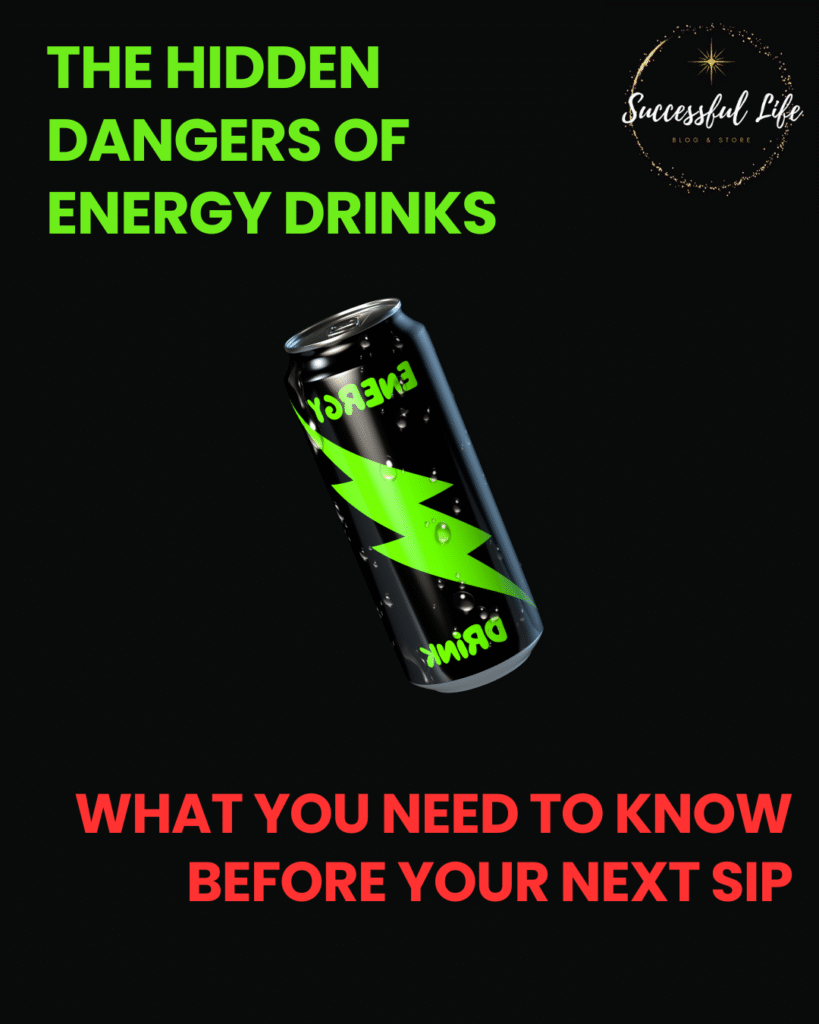In our fast-paced world, many people reach for energy drinks to power through long days, late-night study sessions, or demanding workouts. These colorful cans promise increased alertness, improved performance, and a quick boost of energy. But behind the flashy branding and bold claims lies a growing concern among health experts: the dangers of energy drinks are real, and they could be putting your health at risk.
In this article, we’ll explore what energy drinks really do to your body, examine the side effects, and uncover why health professionals are sounding the alarm. If you’ve ever wondered, “Are energy drinks bad for you?” — this comprehensive guide will provide the answer.
What Are Energy Drinks?
Energy drinks are beverages that typically contain high levels of caffeine, sugar, and other stimulants like guarana, taurine, ginseng, and B vitamins. Popular brands such as Red Bull, Monster, and Rockstar are marketed as quick fixes for fatigue and poor concentration.
While occasional use might seem harmless, regular consumption of energy drinks can lead to serious health consequences.
Top Ingredients That Make Energy Drinks Harmful
To understand why energy drinks can be dangerous, it’s important to examine their key ingredients:
1. Caffeine
Most energy drinks contain between 80 to 300 mg of caffeine per serving, which is equal to or higher than a strong cup of coffee. Excessive caffeine intake can result in jitteriness, heart palpitations, anxiety, and insomnia. For some, especially teens and those with heart conditions, it can be life-threatening.
2. Sugar
Energy drinks often contain as much as 54 grams of sugar per can—well above the American Heart Association’s recommended daily intake. High sugar consumption is linked to obesity, diabetes, tooth decay, and metabolic disorders.
3. Taurine and Guarana
These stimulants are often added to increase energy, but their effects combined with caffeine can amplify cardiovascular risks and cause overstimulation of the central nervous system.
Short-Term Side Effects of Energy Drinks
While energy drinks might provide a temporary energy boost, they often come with unpleasant and even dangerous side effects:
- Increased heart rate
- High blood pressure
- Anxiety and nervousness
- Sleep disturbances and insomnia
- Stomach irritation or nausea
- Dehydration
These short-term symptoms are warning signs that your body is under stress. Ignoring them can lead to more serious health issues over time.
Long-Term Health Risks of Energy Drinks
Research shows that frequent energy drink consumption may lead to long-term damage, especially when consumed over months or years.
1. Heart Problems
Energy drinks have been linked to arrhythmias, high blood pressure, and increased risk of heart attacks, particularly in young adults and individuals with undiagnosed heart conditions.
2. Kidney Damage
The high sugar content and stimulants in energy drinks can contribute to kidney strain and long-term renal issues, especially when combined with dehydration.
3. Mental Health Concerns
Energy drinks are associated with increased anxiety, panic attacks, and even depression. Over time, the body can become dependent on the stimulants, leading to mood swings and mental fatigue.
4. Addiction and Withdrawal
Caffeine is an addictive substance. Regular energy drink consumers may experience withdrawal symptoms such as headaches, irritability, fatigue, and depression when they try to quit.
Are Energy Drinks Safe for Teens?
One of the biggest concerns in recent years is the marketing of energy drinks to teenagers. Despite their young age, many teens consume energy drinks regularly, often mixing them with alcohol during social events.
According to the American Academy of Pediatrics, energy drinks are not safe for children or adolescents due to their high stimulant content. In extreme cases, they’ve been linked to hospitalizations and even death in teenagers.
Energy Drinks and Exercise: A Dangerous Combo?
Many people drink energy drinks before workouts, believing the caffeine boost will improve performance. While it’s true that caffeine can enhance endurance, combining it with strenuous physical activity can place severe stress on the heart, increasing the risk of cardiac arrest and dehydration.
There are safer alternatives for fitness enthusiasts, including natural pre-workouts, hydration drinks with electrolytes, and proper nutrition.
Mixing Energy Drinks with Alcohol: A Deadly Cocktail
Energy drinks are frequently mixed with alcohol, especially among college-aged adults. This combination is particularly dangerous because it masks the depressant effects of alcohol, making users feel less intoxicated than they actually are.
This can lead to excessive drinking, alcohol poisoning, risky behavior, and accidents. The CDC warns that people who mix alcohol with energy drinks are more likely to binge drink and suffer the consequences of impaired judgment.
Are Sugar-Free Energy Drinks Any Safer?
Some may believe that sugar-free or “zero calorie” energy drinks are a safer choice. While these options reduce sugar-related risks, they still contain high levels of caffeine and other stimulants. Additionally, artificial sweeteners used in these drinks may cause their own side effects, such as digestive issues or increased cravings for sweet foods.
So while they might be slightly better in terms of calories, they’re not risk-free.
Safer Alternatives to Energy Drinks
If you rely on energy drinks to get through the day, consider switching to healthier, more sustainable energy sources:
- Water with lemon – for light hydration and a natural energy lift
- Green tea or matcha – contains caffeine with calming L-theanine
- Smoothies – with fruits, greens, and protein for balanced energy
- Balanced meals – eating protein, healthy fats, and fiber keeps energy stable
- Regular sleep – the most natural and effective energy booster
What to Do If You’re Addicted to Energy Drinks
If you find yourself dependent on energy drinks, it’s not too late to make a change. Here’s how to start:
- Gradually reduce intake – don’t quit cold turkey; taper slowly
- Hydrate consistently – dehydration can feel like fatigue
- Replace with healthier drinks – like herbal teas or infused water
- Get enough sleep – establish a regular sleep routine
- Consult a doctor – especially if you experience withdrawal or ongoing side effects
Final Thoughts: Are Energy Drinks Really Worth the Risk?
In a culture obsessed with productivity and performance, energy drinks may seem like an easy solution. But the science is clear: the long-term health risks far outweigh the short-term benefits. Whether it’s heart issues, mental health concerns, or dependence, the dangers of energy drinks should not be taken lightly.
Your energy should come from healthy habits — not from a can.


